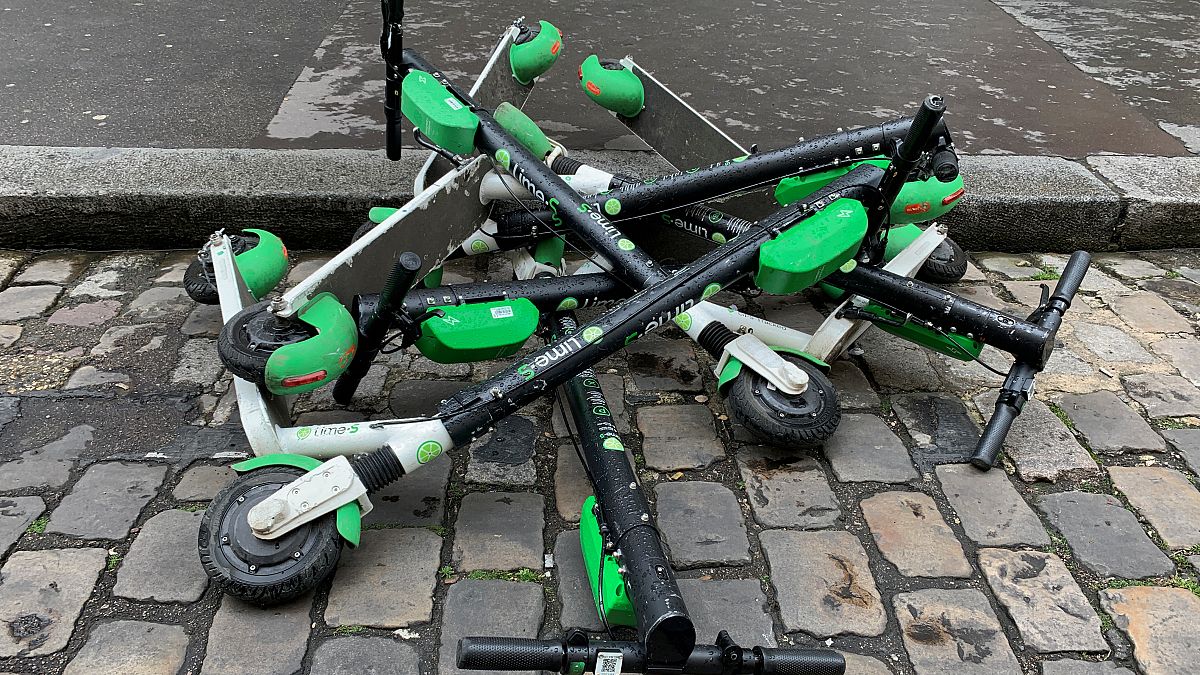The first e-scooter death in France has put the regulation of the trendy vehicles back in the spotlight. Euronews takes a look at how some European countries are tackling the issue.
Last week, France saw its first death on an electric scooter when the driver of a truck hit a 25-year-old man riding an e-scooter in Paris.
The French capital started cracking down on electric scooters earlier this month after an anarchic year in which startups flooded the city's streets with their vehicles.
Mayor Anne Hidalgo announced new legislation that will kick in from July that sets speed limits to 20 km/h in most areas, and 8 km/h in areas with heavy foot traffic, and prohibits parking anywhere but designated spaces.
France's transport minister Elisabeth Borne announced a nationwide ban on e-scooters on pavements from September. Drivers will run the risk of being fined €135 if they break the law.
Have there been any other deaths on e-scooters in any other European countries? And what sort of regulations do other European countries have in regards to the trendy vehicles? Euronews takes a look.
Sweden
The Swedish Transport Agency called to ban electric scooters from bicycle lanes after a 27-year-old man died in a crash while riding one of the electric vehicles in May.
For now, Swedish authorities have passed the following set of guidelines:
If the scooter has a maximum engine power of 250 watts, then the vehicle can only reach a maximum speed of 20km/h.
However, if the e-scooter has a higher engine output of 250 watts, then the vehicle cannot be ridden on public roads but only within a fenced area.
But regardless the type of e-scooter, the following rules apply to every vehicle: the e-scooter must have brakes and a bell, if driving in the dark then the vehicle has to be equipped with front and rear lights and reflectors and if the driver is younger than 15-years-old then they are required to wear a helmet.
Spain
In Barcelona, a 92-year-old woman died in August 2018 after she was run over by an e-scooter — making it the first case of a pedestrian being killed by the electric vehicle.
The woman was out for a stroll in the Catalan town of Esplugues de Llobregat when she was knocked down by a man on an e-scooter who allegedly didn’t see her because he was looking down at his mobile phone.
A court was investigating the man on the e-scooter for involuntary manslaughter.
Some Spanish cities like Barcelona and Madrid have banned the vehicles from pedestrian zones but there is still no nationwide regulation about their use.
The Spanish traffic authority (DGT) is working on a set of national guidelines for the use of the e-scooters including banning them from pavements, requirements for users to wear reflective wear, demand insurance for the vehicle, and impose a speed limit of 25 km/h.
For the moment, there is no set date for the release of the regulations.
Germany
In May, the German Bundesrat — a legislative body that represents the sixteen states of Germany at the national level — passed regulation concerning the use of e-scooters, which became effective on Saturday 15 June 2019.
The regulations dictate that e-scooters are not allowed to go faster than 20km/h, are not allowed on pavements and in pedestrian precincts, the minimum age for use is 14 years-old, the vehicles have to have brakes and lights, and will need special insurance (a compulsory special insurance sticker was created to put on the vehicles). However, it is not mandatory to wear a helmet.
Italy
Italy will get a new law regulating the use of e-scooters before the summer is over, following a decree signed last week by the Minister of Transport, Danilo Toninelli, which will regulate electric scooters, Segways, monowheels and hoverboards.
However, it will be up to town mayors to implement the new rules and decide where they will be allowed to circulate.
The new law will have a trial period of 24 months after which mayors will report back to the Ministry of Transport on how well the law is working.
UK
The Department of Transport has said that e-scooters are not allowed on the road or the pavement. The only place where you can ride e-scooters legally is on private land with the permission of the landowner.
They are classified as Personal Light Electric Vehicles (PLEVs), which means they are treated as motor vehicles and would need to have suitable insurance and number plates, and their riders would need licences and helmets.
